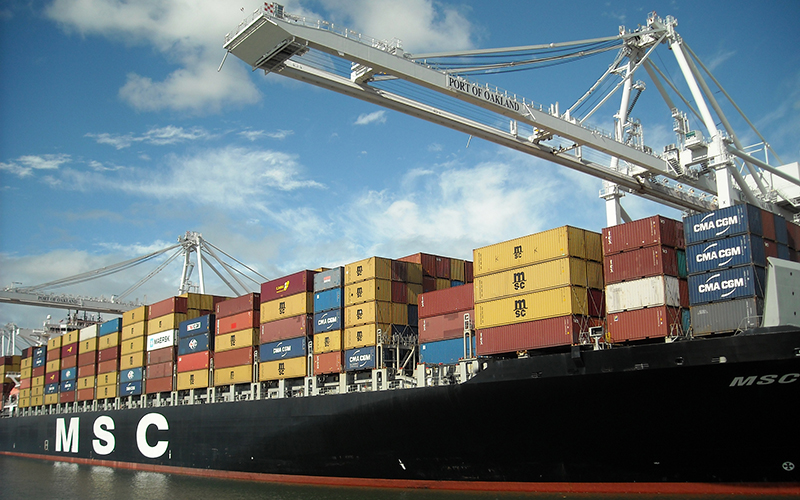WASHINGTON – Ray Zuckerman felt some relief when President Donald Trump signed an executive order to withdraw the United States from the Trans-Pacific Partnership – and some reservations.
Relief because he felt the multination trade pact was rushed through with little oversight, but reservations because Zuckerman, a Phoenix business owner who does a brisk international trade, worries that losing the deal could harm free trade.
“The principle of free trade is good,” said Zuckerman, CEO of Phoenix-based ServerLift, which specializes in data center storage and transportation solutions.
“But I don’t know anybody that knows what (the agreement) actually says,” he said of the trade deal. “If you handed me the document I wouldn’t know what it said.”
Zuckerman’s dilemma represents the complex and sometimes-contradictory sentiments on the deal that has historic antagonists finding common political ground and trade experts debating what’s best for the economy.
According to a report from the International Trade Administration, Arizona exported $13.3 billion in goods in 2015 to the 11 Pacific Rim countries involved in the TPP. That number accounted for 58 percent of the state’s total exports that year.
More than 4,000 Arizona companies exported goods to TPP countries in 2014, of which the majority were small and medium sized businesses – like Zuckerman’s.
The deal would have eliminated more than 20,000 tariffs, some of which exceed 35 percent, while seeking regulatory cooperation on environmental, human rights and intellectual property standards from the partner nations.
But critics say negotiations by then-President Barack Obama’s administration were opaque, pointing to the “fast track” process under which Congress could only have voted the deal up or down, without amendments.
That deal was never ratified by the last Congress, which allowed Trump to issue his Jan. 23 executive order pulling the U.S. out of the pact.
Trump has vowed to craft better deals with trading partners on an individual basis, a promise he repeated in meetings with the prime ministers of major trade partners – and TPP members – Japan and Canada Friday and Monday. But Trump pointedly noted that any adjustments those countries would not be as significant as they would be with Mexico.
The 12 nations that were part of the Trans-Pacific Partnership, which President Donald Trump plans to scrap.
Zuckerman said abandoning the deal and embracing economic protectionism is not the right solution for Arizona, and that free trade would increase prosperity and increase international access for Arizonan products.
But Trump campaigned against the deal, which he called a “potential disaster.” His opposition was in line with that of prominent liberal lawmakers like Sens. Bernie Sanders, I-Vermont, and Elizabeth Warren, D-Massachusetts. They blasted TPP for benefitting companies that outsource jobs and potentially allowing corporations to sue nations whose laws or regulations hurt profits.
Arizona Rep. Ruben Gallego, D-Phoenix, was and remains an outspoken opponent to the agreement.
“International trade increases wealth among the wealthy,” Gallego said.
And while he agrees with Trump on very little – and thinks the president’s opposition to the pact comes from self-interest rather than concern for working Americans – Gallego said protectionism is a natural response to a shrinking middle class and wage stagnation.
“We need a strong middle class, and I don’t believe that TPP would build (that),” said Gallego, who also called protectionism “very much the consensus of American voters.”
Like Trump, Gallego said he supports negotiating individual trade deals and taking another look at existing ones like the North American Free Trade Agreement to ensure that working Americans are the ones coming out ahead.
Some Arizona business leaders are unconvinced and, like Zuckerman, think the state would benefit from more open trade.
“We believe that trade is a major contributor to prosperity worldwide,” said Garrick Taylor, vice president for government relations at the Arizona Chamber of Commerce. “It helps Arizona products make their way overseas.”
He pointed to some of the same figures in the ITA report – tens of billions of dollars in Arizona machine goods, technology, metals and agriculture shipped to TPP nations.
“We would have loved to have seen those high tariffs go down” under TPP, he said.
Taylor said a favorable trade environment would benefit the state’s burgeoning industries, led by tech companies like Intel and Honeywell, as well as create opportunities for export jobs.
He said the private sector needs to better educate lawmakers and citizens on the benefits of free trade, and warned that the next target will be NAFTA, in which Arizona has an even bigger stake given its proximity to Mexico.
The decision to withdraw the U.S. from the partnership before the ink had dried has proven unpopular with many even in the president’s own party. Sen. John McCain, R-Arizona, said after Trump’s order that he feared leaving the TPP would cede trade leadership in the Pacific Rim to China, America’s top competitor in the region.
McCain’s fears are reasonable, said Anna Maria Mayda, an associate professor of economics at Georgetown University. Mayda said China is already leading the negotiations on a separate deal focusing mostly on tariff reduction called the
Regional Comprehensive Economic Partnership.
“The (TPP) agreement was a way for the U.S. to effect its own rules in that part of the world,” she said. By pulling out, “a void is left.”
